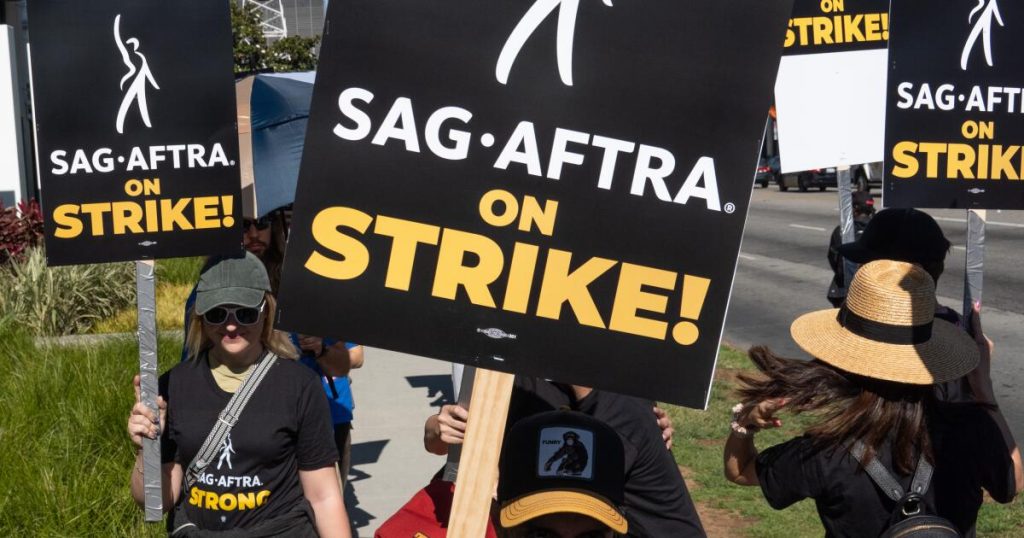Performers union SAG-AFTRA and the alliance representing the major Hollywood studios are meeting Wednesday for the second consecutive day in hopes of ending the 104-day actors’ strike that has shuttered film and TV production and dealt a severe blow to the entertainment industry.
Official talks between guild leaders and the Alliance of Motion Picture and Television Producers resumed Tuesday. The union went on strike in mid-July — following the lead of Hollywood writers, who walked out in May and have since resolved their labor dispute.
The studios put a new offer on the table Tuesday that they considered to be more generous than the previous one, but the sides remain divided — particularly when it comes to revenue-sharing in the streaming era, according to sources familiar with the matter.
“Today, the CEOs came back to the table. We are scheduled to continue talks with them tomorrow,” the SAG-AFTRA negotiating committee said in a message to members after Tuesday’s meeting. “We will continue to provide updates with you directly. Remember — don’t believe anything you read in the press unless it comes directly from us.”
Earlier this month, negotiations between the Screen Actors Guild-American Federation of Television and Radio Artists and the studio alliance broke down primarily because of the ongoing dispute over streaming pay.
After the studios rebuffed SAG-AFTRA’s initial request for 2% of all streaming revenue, the guild proposed an annual payment of about 57 cents for every streaming subscriber worldwide.
The alliance rejected that proposal as well, arguing that such a model would “create an untenable economic burden” and cost the entertainment companies more than $800 million per year. (Some have disputed that number, speculating that the losses would be closer to $500 million.)
The disagreement over streaming compensation ultimately led the studios to walk away from the bargaining table, lamenting that the divide between the two parties remained “too great” to proceed.
For its part, SAG-AFTRA leaders accused the alliance of implementing “bullying tactics” and maintained that the only way to make progress is by “talking to each other.”
Following the last round of negotiations, some of the most prominent members of SAG-AFTRA — including George Clooney, Scarlett Johansson, Ben Affleck and Emma Stone — approached union leaders to try to come up with a strategy to end the strike.
The A-listers suggested eliminating the current $1-million cap on SAG-AFTRA membership dues so that wealthier members could contribute more money and raise funds for struggling actors. While the guild’s negotiating committee deemed the celebrities’ offer “generous” and “worthy of consideration,” they made clear in a memo to members that such a gesture would “have no bearing” on the contract they’re bargaining for.
The stars also proposed a new residual structure that would result in the lowest-billed cast members — who might be less financially secure — getting paid first and the top-billed actors getting paid last. SAG-AFTRA President Fran Drescher said last week that payment model didn’t “hold water” after being analyzed by the guild’s negotiating team and attorneys — although she appreciated the “effort and desire to be supportive.”
The two sides agreed to come back to the table after the Walt Disney Co. Chief Executive Bob Iger reached out to SAG-AFTRA’s chief negotiator, Duncan Crabtree-Ireland, according to a person familiar with the matter who was not authorized to comment. The studio’s outreach has served as a confidence booster for striking actors who believe they have the leverage, as studios are eager to restart production to salvage next year’s summer film releases and at least part of their scripted TV season.
The performers union, which represents about 160,000 workers, is seeking a bigger slice of the streaming pie; protections and limitations surrounding self-taped auditions and artificial intelligence; and higher minimum wages, among other demands.
The studios have contended that the guild is asking for too much, considering few streaming platforms are profitable.
While Netflix co-CEO Ted Sarandos acknowledged this month that “all these guilds are not created equal and they all have different needs,” he mused that SAG-AFTRA’s latest streaming-pay proposal proved “a bridge too far.”
But Drescher recently told The Times that the industry’s shift to streaming has fostered an “economic dystopia” that has diminished opportunities for actors and left them in the dark about how much their work is benefiting their employers.
“I will not cave and I will not let them down,” Drescher said, “no matter what vitriol or intimidation tactics the companies choose to throw at me.”
Times staff writer Wendy Lee contributed to this report.
